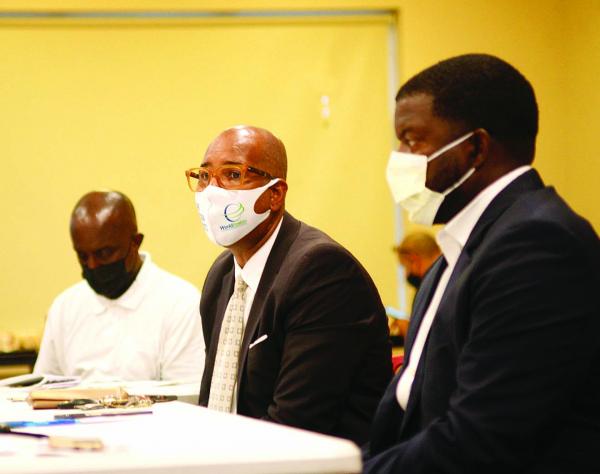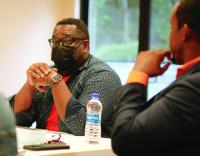October 8, 2021

Former at-large Council candidate Reggie Collimon talks about expresses the frustrations he felt on Sept. 14 after running a lively campaign but finishing out of the running in the Preliminary. Ron Bell, left, and former District 4 Candidate Will Dickerso

The many facets of the Sept. 14 preliminary election are still being debated in many corners of the city, but within the Black community – particularly among activists and Black former candidates – the sentiments of disappointment and frustration were made clear soon after the polls closed.
For the first time ever, three Black candidates — Kim Janey, Andrea Campbell, and John Barros— were running for mayor, with many more seeking at-large and district seats on the city council. Activists like Ron Bell of Dunk the Vote say the lackluster performance of most Black candidates in the preliminary has been a blow.
“Now is the time for Black folks in particular to face some hard realities about the mayor’s race, and to start getting behind Black candidates and stop bringing the other stuff to the table,” said Bell, who is among a small team of community leaders who have partnered with media specialists from the Massachusetts Institute of Technology (MIT) to combine boots-on-the-ground activism with the emerging technology of using computer learning to analyze recorded viewpoints and conversations.
The effort, known as Real Talk For Change (RTFC), had its beginnings in 2019 during the 12th Suffolk legislative race, eventually won by now-state Rep. Brandy Fluker Oakley. A new phase of the project kicked off in August to do an expanded analysis of under-heard voices in the 2021 municipal election.
Recently, RTFC gathered several of the Black candidates and activists in Codman Square to talk about what happened – and to use those opinions as part of the larger analysis of the election. Those in attendance included former at-large candidates Reggie Collimon, Said Abdikarim, and Nick Vance. Will Dickerson III, who ran unsuccessfully in the District 4 race, was also on hand.
Collimon, who finished second to last in at-large balloting, said he never dreamed he would finish that far down. “Money is a key factor,” he said. “I ran my own campaign. The money that people spend on ads shows what a barrier it is for so many people in our communities. It’s a business,” he said.
Collimon, who was born in Haiti and worked as a liaison for former Mayor Martin Walsh, said he didn’t expect to come in at the top of the ticket, but he felt that the Haitian American vote alone would be enough to carry him into November.
“There are thousands of Haitians in Boston. I was on a show every Wednesday and Thursday since I announced talking about the issues. I felt that if I were to get 20 percent of just them, I would have made it to the other side. It saddens me to see that that didn’t happen,” he said.
Ruthzee Louijuene, a first-time candidate of Haitian descent, had a far better showing, placing third in the at-large contest behind two incumbent councillors, Michael Flaherty and Julia Mejia.
Abdikarim, who finished 12th out of 17, said he knew very little about politics before jumping in as a first-time candidate, and came to learn that it was much harder to get elected despite the demographics of the city.
“When it comes to campaigning for the last nine months, I gained a lot of knowledge,” he said. “I decided to get into politics not knowing what politics was like. I learned a lot.”
Dickerson III said he left feeling it is very important to get a Black man into office as an at-large candidate, and even though he didn’t prevail in the District 4 race, he is continuing to try to get the vote out. He has thrown his support behind David Halbert –the only Black man left in the at-large race.
“I’m really hoping David is able to be our voice on the City Council; it’s been a long time since a Black man was elected at-large to the City Council,” he said. “To thousands of Black men in the city of Boston, that does matter in having someone that looks like you as a voice. It definitely matters on a lot of levels.”
Dorchester and Mattapan activist Lisa Searcy said her opinion is that people need to get engaged and start doing their homework – and don’t vote for those that simply stop in during election season.
“We have to also get rid of the idea people have in that they won’t vote in the preliminary and they’ll only vote when it matters. The preliminary is when it really counts for us. You have to know what you’re working for. I don’t mean this with disrespect, but because you look like me doesn’t mean you’re for me. Too many people come into our community when it’s time to vote – drive-bys,” she said.
All of that and more was fodder for the RTFC and MIT academics who will continue to interview people through the Nov. 2 election campaign and beyond.
“A key focus… is to reach beyond academia to collaborate with experienced, locally-based organizations serving underrepresented and underheard communities,’’ says Deb Roy, MIT Professor of Media Arts and Sciences and Director of MIT’s Center for Constructive Communication. “By engaging with pilot programs like RTFC we hope to leverage data-driven analytics to better understand community issues and, with this knowledge, to design new tools and communication networks capable of bridging social, cultural, and political divides.”
Karilyn Crockett, former chief equity officer for the city of Boston and Assistant Professor of Urban History, Public Policy and Planning at MIT, is also part of the RTFC effort.
“Real Talk for Change understands this moment and the urgent need to get more and more residents engaged in the political process before and after election day,” said Crockett. “As part of a generation of Bostonians who have waited decades for the city’s political establishment to reflect its demographic makeup, I’m proud to be a part of this important and timely effort.”
Added Dorchester’s Corey Thompson, who spoke at the Codman Square session: “After this election, it feels like the Black community is metaphorically in chains because it won’t vote or move forward…If they feel their vote doesn’t matter, they won’t come out…We still have a long ways to go.”



